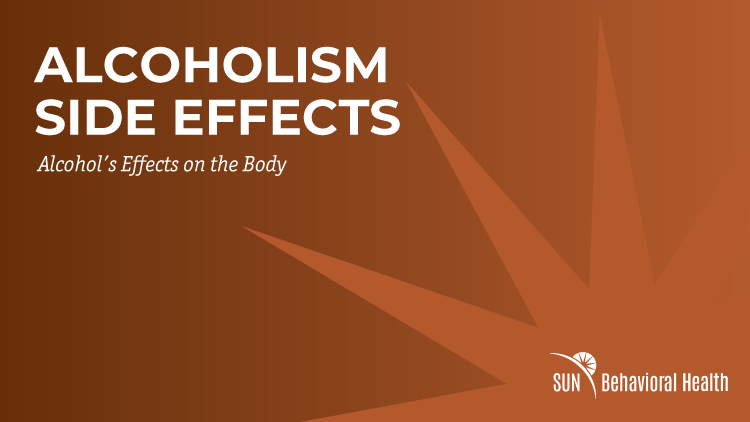Services
- Home
- Mental Health Services
- Who We Treat
- How We Treat
- Patients & Visitors
- About
close

Lonnie had been drinking every day for the past 5 years. He always felt like he was the one in his friend group that could hold his liquor. One day, Lonnie realized that the right side of his abdomen was in slight pain. He decided to ignore it, but the pain worsened as time passed. He went to his doctor, who ran some tests and said he had a fatty liver. After asking about Lonnie’s alcohol use, his doctor explained that a fatty liver is an alcoholism side effect. He urged him to seek treatment and stop his alcohol use to reverse the effects that he was feeling.
In 2018, 6% of Texans reported heavy drinking, which is 15 or more drinks per week for men and 8 or more drinks for women. SUN Behavioral Health knows that a crisis does not always occur when the timing is convenient. So, we provide 24/7 crisis care, allowing you to get started on your treatment in the moment before you have a chance to change your mind. Several alcoholism side effects can happen when you are drinking alcohol, especially if you participate in heavy drinking. Today, we are going to discuss them.
Alcohol plays a significant role in how the body functions as a whole. Depending on which of the stages of alcoholism you are in may determine how much it impacts your body in the long-term. At the same time, this is not always the case, as sometimes a single occasion can cause damage or death. Many of the side effects of alcohol can be a sign of an alcohol use disorder. In most cases, stopping drinking and seeking treatment for an alcohol use disorder can reverse the damaging effects of alcohol.
Alcohol can have a significant effect on the liver. This effect can include the build-up of fatty liver. While most people with fatty liver do not have symptoms associated with it, it can cause some discomfort in the right side of the abdomen. Fatty liver is treatable by stopping alcohol use. People might also develop alcoholic hepatitis. This disease involves a swollen liver with liver cells destroyed. Symptoms can be mild or severe, including jaundice, abdominal pain, and vomiting. It can be life-threatening, and the best way to prevent it from worsening is to stop drinking alcohol.
Others who participate in chronic heavy drinking can develop cirrhosis. This condition typically occurs when someone has spent 10 or more years participating in heavy drinking. In this condition, scar tissue builds up and replaces liver cells. Typically, reversing this condition is not possible. People with early cirrhosis may not have symptoms but will develop symptoms as it progresses. These symptoms can include an enlarged spleen, bleeding from veins, fluid in limbs, pressure in the liver, fatigue, and weakness.
Alcohol is a depressant, meaning drinking it will slow down neuron communication. The slowed communication decreases the activity in your brain. It ultimately will slow down how different body parts communicate with each other and the brain. This results in visual impairment, lost periods of memory, reduced ability to think, and slurred speech. Long-term alcohol use might cause numbness in extremities, trouble swallowing or talking, and neuropathy, which happens when nerves are damaged.

Single-use or short-term use of alcohol can result in side effects. These side effects can occur in both people with an alcohol use disorder and those who do not have an alcohol use disorder. Most of the time, they happen when one’s blood alcohol content (BAC) has reached levels of intoxication. It takes approximately one drink per hour to get to this level. Side effects can include lowered inhibitions or trouble concentrating. Others might have a loss of critical thinking or mood swings.
Alcohol might raise your blood pressure and lower your body temperature. Passing out and vomiting are common side effects of short-term alcohol use. Alongside that, injuries can also occur from a night of binge drinking. These injuries can come from drowning, falls, or car accidents. People are more likely to engage in violent behaviors that include sexual assault or homicide when drinking. Reckless behavior such as unsafe sex that leads to pregnancy or sexually transmitted diseases can also occur. If a pregnant woman drinks, it can result in fetal alcohol spectrum disorders (FASDs) or miscarriage.
Chronically drinking alcohol over a long period can result in serious health concerns as side effects. These side effects affect several body areas, including the heart, brain, liver, and digestive problems. These include high blood pressure, liver disease, stroke, and digestive concerns. Cancer is also a common long-term side effect that can occur due to long-term alcohol use. These cancers can include the liver, colon, throat, breast, and esophagus. Alcohol will also weaken the immune system over time, leading you to get sick more often. People with chronic alcohol use might develop dementia or have other memory problems. Alcohol use can also lead to depression or relationship problems, as well as lower job performance or unemployment.
Alcohol withdrawals occur when someone decides to stop drinking alcohol. They can occur during alcohol use disorder treatment or if you were to do it on your own. However, do not stop your alcohol drinking on your own and seek the observation of a medical professional. Alcohol withdrawals can be very uncomfortable and, while uncommon, have complications. There are several symptoms that you might experience during alcohol withdrawal. Remember that you might not experience all of them, and you might experience different ones than a friend or family member experienced. You might encounter intense cravings, shakiness, nausea, and fast heart rate. Complications can include seizures and hallucinations.
Alcohol poisoning is a life-threatening condition that requires immediate medical care and occurs when there is too much alcohol in the bloodstream. This excess alcohol results in the brain beginning to shut down different functions of the body, such as breathing, temperature control, and heart rate. Symptoms of alcohol poisoning might include difficulty remaining conscious, trouble breathing, slow heart rate, choking, and extremely low body temperature. Alcohol poisoning can be life-threatening if the person does not receive medical attention.
Never assume someone who experiences alcohol poisoning can sleep it off – call 911 immediately. While you wait for responders to come, do not leave the person alone. Keep them lying on one side with their ear on the ground to prevent choking. Do not get them to drink hot coffee or walk, as it can worsen things. Be prepared to give the responders information, such as if they took any substances, the amount of alcohol they drank, and any health information you might be aware of. Being aware of the symptoms of alcohol poisoning can help keep your loved ones safe.

If you or a loved one are living with alcohol use disorder, it is never too late to seek help. While seeking treatment might seem like a terrifying experience, we can help make that experience more accessible to manage based on your individual needs.
SUN Behavioral Health Houston solves unmet needs in our community by providing a women’s trauma program tailored to provide a safe, healing environment specifically for women. For more information or to start your recovery journey today, call us at 713-796-2273.
Later in life, alcohol use disorder can cause dementia. It can also result in several cancers, liver disease, and strokes.
If you drink alcohol every day, it can destroy your liver cells. The liver may also swell, and several side effects, such as jaundice or abdominal pain, may occur.
Three symptoms of someone with an alcohol use disorder are high blood pressure, a weakened immune system, and digestive problems.